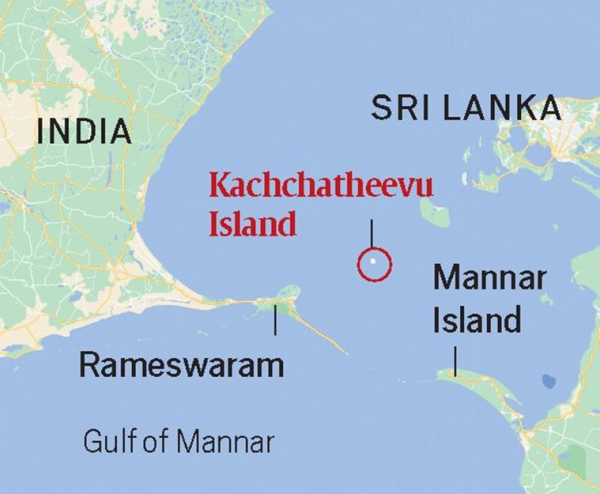Important for
Prelims: Geography; International Relations
Mains: General Studies Paper II

Katchatheevu Island, a small rocky islet in the Palk Strait, has been a subject of historical, political, and legal contention between India and Sri Lanka. Its strategic location and historical significance make it a crucial topic for candidates preparing for the UPSC exam. This article aims to delve into the multifaceted aspects of Katchatheevu Island, providing a comprehensive understanding for UPSC aspirants.
Historical Background:
The history of Katchatheevu dates back to ancient times when it was used by fishermen from both India and Sri Lanka. However, its sovereignty became a contentious issue during the colonial era, particularly under British rule. The island was administered by the British, and post-independence, its ownership became a matter of negotiation between India and Sri Lanka.
Indo-Sri Lankan Agreements:
In 1974, India and Sri Lanka signed the Katchatheevu Agreement, which effectively ceded the island to Sri Lanka. This agreement, however, sparked debates and controversies in both countries. Critics argued that the agreement infringed upon the traditional fishing rights of Indian fishermen in the region. Despite protests and legal challenges, the agreement stands to this day.
Legal Perspectives:
The legality of the Katchatheevu Agreement has been a subject of debate. While India argues that the agreement was merely a territorial concession and did not affect fishing rights, critics point out that it has resulted in the harassment of Indian fishermen by the Sri Lankan navy. Various PILs (Public Interest Litigations) have been filed in Indian courts challenging the validity of the agreement.
Geopolitical Significance:
Strategically located in the Palk Strait, Katchatheevu holds geopolitical importance for both India and Sri Lanka. Its proximity to international shipping lanes and its potential for offshore resource exploration make it a valuable asset. Additionally, control over the island provides leverage in maritime disputes in the region.
Impact on Fishermen:
The most significant impact of the Katchatheevu Agreement is felt by the fishermen of Tamil Nadu. The traditional fishing grounds around the island have been restricted, leading to clashes with the Sri Lankan navy. Incidents of arrests, harassment, and even fatalities have been reported, exacerbating tensions between the two nations.
Diplomatic Efforts: Both India and Sri Lanka have made diplomatic efforts to address the concerns surrounding Katchatheevu. Bilateral talks, joint patrolling initiatives, and proposals for a fishing zone have been put forward to alleviate the plight of fishermen. However, a lasting solution remains elusive, as deeper political and historical issues persist.

Katchatheevu Island continues to be a focal point of contention between India and Sri Lanka, with far-reaching implications for bilateral relations, maritime security, and the livelihoods of fishermen. Its complex history, legal challenges, and geopolitical significance make it a crucial topic for UPSC aspirants to comprehend thoroughly. As the debate surrounding Katchatheevu evolves, it underscores the importance of nuanced understanding and diplomatic dialogue in resolving territorial disputes.
Practice Questions for Prelims
Arrange the following from East to West:
1. Kanyakumari
2. Rameshwaram
3. Katchatheevu
4. Jaffna
Choose the correct code:
a) 1-2-3-4
b) 4-3-2-1
c) 1-3-2-4
d) 1-3-4-2
Ans. b)




Leave a Reply
You must be logged in to post a comment.